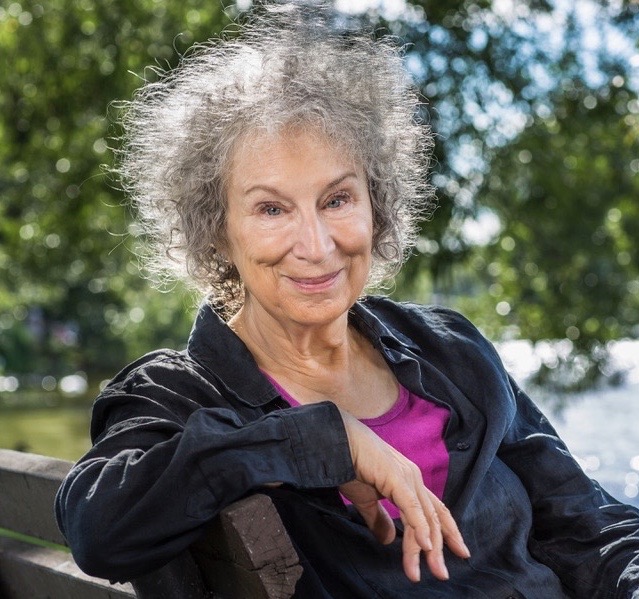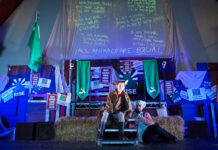“There have been many requests for a sequel which I’ve always said no to,” famous author Margaret Atwood explains.
“However, as time moved on, and instead of moving further away from Gilead, we’ve started moving toward it, particularly in the United States, so I reexamined that position.”
On Tuesday September 10, the wait was over; The Testaments, Margaret Atwood’s highly anticipated sequel to The Handmaid’s Tale, was revealed and the momentous literary event was celebrated with an exclusive live cinema broadcast of ‘an evening with’ the Canadian novelist, poet, literary critic and inventor.
“none of this would be happening unless countries were putting people in charge of women’s bodies who are not those women.”
It was so successful that Margaret Atwood is now on tour, and coming to Oxford’s New Theatre on Wednesday, where she will discuss at length her remarkable career, her diverse range of works, and why she has returned to her seminal handmaid story, 34 years later.
Because no one is more on trend than Margaret, thanks to the current, Emmy Award-winning television series of The Handmaid’s Tale in 1985 which has created a cultural phenomenon, handmaids becoming a symbol of women’s rights and a protest against misogyny and oppression.
Would you ever go back to Gilead again? “I never say never to anything because I have said never before and been wrong”
The huge crowds at the midnight launch meant it was compared to the Harry Potter phenomenon: “Well, London loves a happening. It is quite amazing how people will turn out in the middle of the night to see the big pile of books revealed, like Aunt Lydia’s statue. It was lots of fun. I think people had a pretty grand time.”
And what about being called a ‘literary rockstar’? “Well considering the lives that rockstars live I’m not so sure – I haven’t died of an opiate overdose, not yet anyway.
“I think this kind of thing can be quite ruinous for a 35 year-old, because where do you go from there? But in my case we kind of know the answer.
“So am I overwhelmed by it? I’m very pleased and grateful to the readers who have stuck with me over the years, and the teams of people who have been working amazing numbers of hours putting it all together and trying to keep the lid on [the book]. There were concerted efforts I’m told for ‘phishing’ expeditions, and phoney emails trying to winkle even a few pages out of people who had the manuscript, but they held firm.”

As for the TV series itself, how much did her involvement affect how she embarked on this new book?
“Bruce Miller [showrunner of the TV series] and I are in regular communication. I read the scripts and make notes on them, although I don’t have any actual power, I have quotes “influence”, much like Thomas Cromwell. Luckily we are in accord most of the time, so when I said ‘you can’t kill that person’ or ‘hands off that baby’ he said ‘ok’. I couldn’t tell him why at the time but he has now read the book and is thrilled to have been given more white board space for his team’s writing room,” she explains.
How does it feel to see your work being used in protests against the control of women’s bodies?
“A wave of protests started in Texas, where an all-male legislative group was bringing in laws about women’s bodies. The scene looked like a shot straight from the TV series. As a protest tactic it works because you’re not making a disturbance, you’re sitting silently and modestly, and you can’t be kicked out for dressing inappropriately. They put it together quite hastily and ordered outfits from the internet, but when they arrived they were pink so they very swiftly had to sew red ones. It was a very striking visual image, which went around the world.
“Everybody looking at it knows what it means, so it’s a question of things escaping from a book into the real world. But none of this would be happening unless countries were putting people in charge of women’s bodies who are not those women.
“For a society that claims to value individual freedom, I would say to them evidently you don’t think this individual freedom extends to women.”
Was there a pressure then when writing the book to accurately reflect what is happening currently in the United States?
“There is always a danger of letting down the audience, but it’s a danger I have faced before. Back in 1985 people were already saying these things. People were talking about what they would like to do in the United States if they had the power. Now they have the power.
“Until the Berlin Wall went down and the Cold War ended, the United States was selling itself as the alternative to the Cold War evil empire. So they were the land of freedom, democracy, equality and opportunity for all, and therefore they were not showcasing their shadow side.
“But once that opponent was gone, everything could come out of the cupboard that had always been there, and out it has come.”
“For a society that claims to value individual freedom, I would say to them evidently you don’t think this individual freedom extends to women.”
When did she start writing The Testaments then? “I sent a two paragraph summary to my publishers on February 17 2017, saying what it was and who was going to be in it. I think they were probably terrified, because it sounded like a mad idea. So I must have been far enough along with it by then that I could tell them what I was doing.
“It was 2015 – 16 when I started writing the summary and the TV series started shooting. Then the election happened in November of that year, at which point everyone in the team woke up and said ‘we’re in a different show’. Not that the show changed, the frame completely changed. So that is the progress of events. I wrote part of it in a dome car [train] going across Canada, which was a great place to write because nobody phoned, they couldn’t.
Would you ever go back to Gilead again? “I never say never to anything because I have said never before and been wrong; I’ve also said ‘I’m writing this’ and then I didn’t. So I think it’s best not to tell anybody what you may or may not do, because if you do something else there are just going to be endless questions about why you didn’t do what you said you were going to do. Politicians experience this all the time, but writers can avoid it by just not saying anything.”
SOLD OUT: Margaret Atwood: New Theatre Oxford, Wed Oct 30
ENDS


















